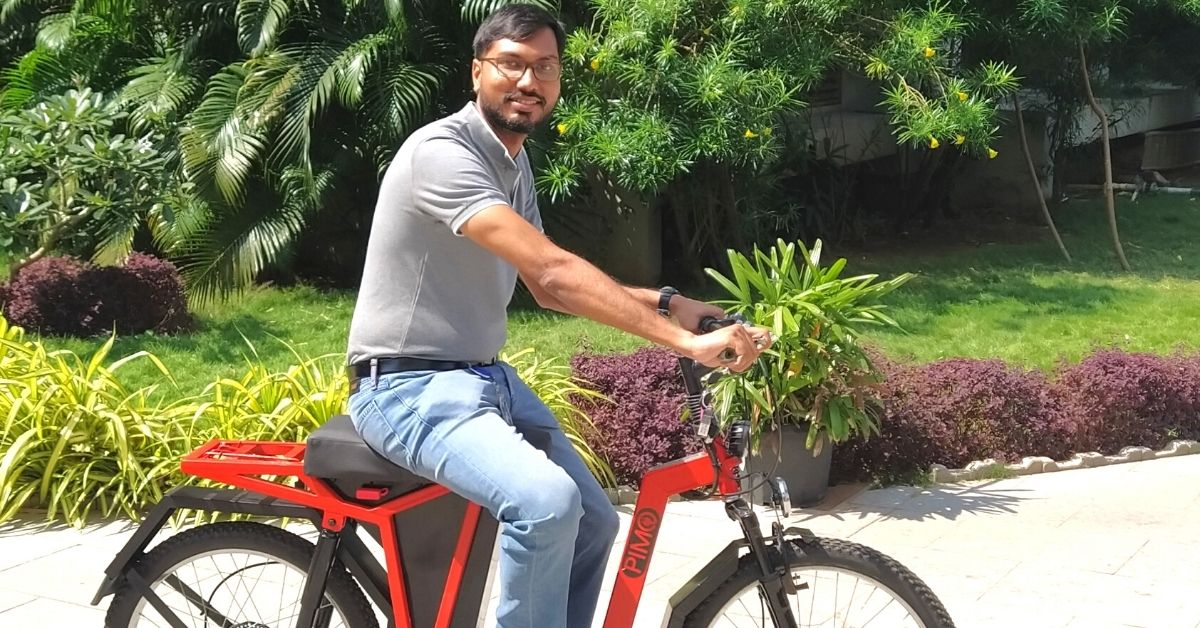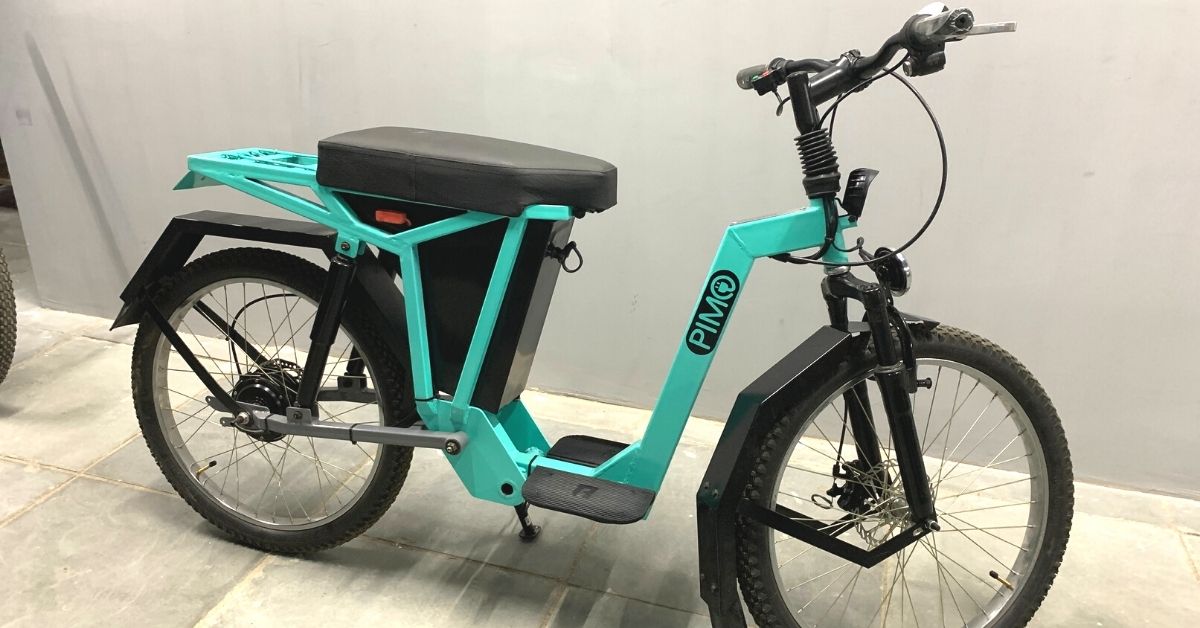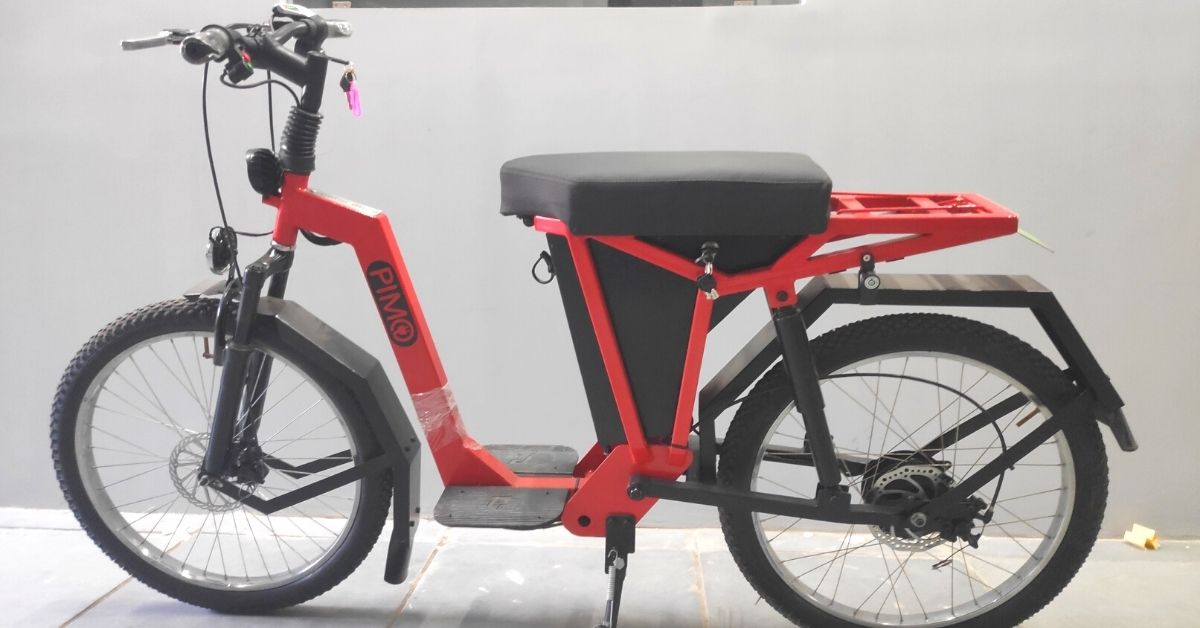As Simple as Charging Your Phone, This E-Bike Goes 50km on One Charge
Visakh Sasikumar, founder of the startup Pi Beam, just launched the PiMo micro-utility e-bike. It costs Rs 30,000

A quick trip to the corner grocery store in your car or bike might save you the physical labour of having to walk or cycle, but the ever present guilt of burning fuel for this short-term purpose will remain. So, what if a bike exists that can save you from a tiring journey and save fuel at the same time?
An innovative e-bike made by IIT Madras alumni fills these gaps, and more. Visakh Sasikumar, founder and CEO of IIT-M incubated startup Pi Beam says the e-bike covers 50 km on a single charge, and that charging its batteries is as easy as a mobile phone’s. Moreover, one doesn’t need a license or registration to ride.
“The e-bike is packed with features found on a moped, such as the electric horn, LED light, dual suspensions, disc brakes, long seat, and metal mudguards. By providing a maximum speed of 25 km per hour, the vehicle presents all the comforts of a two-wheeler at an affordable cost. This e-bike is suitable for people of all ages,” says Visakh.
He adds, “The unique aspect of the e-bike is that it uses the same power socket that goes into charging a smartphone, and takes around the same time to charge.” The company has sold about 100 vehicles to customers across India so far.
Small and efficient

Visakh says the bike was designed to make micro-mobility, such as making short trips within 5-10 km, easier. “It is a criminal waste of money to take out a car or a bike and burn fuel for a short trip to buy a Rs 30 packet of milk, or a few vegetables. Apart from causing pollution and adding to expenses, the vehicles occupy big spaces on roads. The micro utility vehicle addresses those needs,” he adds.
Beyond personal use, he says the micro-utility vehicle will be more useful and affordable to food delivery businesses and low-income groups. “A fuel-driven two-wheeler costs about Rs 60,000. However, the e-bike costs half the price, without recurring expenses of fuel,” he explains.
The IIT alumni says the inspiration to develop the e-bike came during his graduation. “I participated in many competitions that demanded using scrap bicycles or two-wheelers to turn them into electric tricycles. The idea behind such exercises was to develop small and efficient vehicles that would cause less pollution and cover short distances,” he adds.
G K Venkat, managing director at Centric Foods and among those who bought the e-bike, says, “I bought it for my business as well as for personal use. The e-bike is an efficient way to move around in one’s local area. The cost of fuel is increasing, and the vehicle seems like an economical option for India, and most suitable for the country’s roads.”
Venkat aims to deploy more e-bikes for food delivery. “The e-bike is usually looked at as a luxury, but its low cost will ensure its availability across various segments such as food delivery, personal use and for the elderly,” adds the 33-year-old.
Challenges and risks

Visakh says after spending a year on conceptualising the design, conducting testing and overcoming many hurdles, the vehicle was ready. “It was hard to convince vendors to create 30 prototypes for a small startup whose fate was unknown. Gaining their trust and helping them envision the potential of the product took time,” Visakh says.
He adds that the team members held many debates about the features and design that need to be included or excluded. “The features play a huge role in determining sales of the vehicle. Also, the frame of the vehicle has no curves, and the bike looks naked. It was tough to choose a design that would be widely acceptable to the market. But, we took the risk of having a sharp-edged design for the e-bike,” Visakh says.
Visakh adds that an employee rode the bike and covered 54 km per day while commuting to their office for almost a year. “We wanted the e-bike to be tested vigorously on roads with potholes, water and other such obstacles to ensure that it delivers on the promises made to the consumers,” he says.
The entrepreneur says that 90 per cent of the vehicle is built from parts sourced in India. “Only the motor gets outsourced, and we are working to make an indigenous motor simultaneously. We are planning to reach out to markets in Bengaluru, Pondicherry and rural pockets as such vehicles have huge potential for usage there,” he adds.
Pi Beam aims to sell 10,000 e-bikes in the current financial year.
Pi Beam can be reached at [email protected], and on 8825893244.
Edited by Divya Sethu
If you found our stories insightful, informative, or even just enjoyable, we invite you to consider making a voluntary payment to support the work we do at The Better India. Your contribution helps us continue producing quality content that educates, inspires, and drives positive change.
Choose one of the payment options below for your contribution-
By paying for the stories you value, you directly contribute to sustaining our efforts focused on making a difference in the world. Together, let’s ensure that impactful stories continue to be told and shared, enriching lives and communities alike.
Thank you for your support. Here are some frequently asked questions you might find helpful to know why you are contributing?


This story made me
-
97
-
121
-
89
-
167













